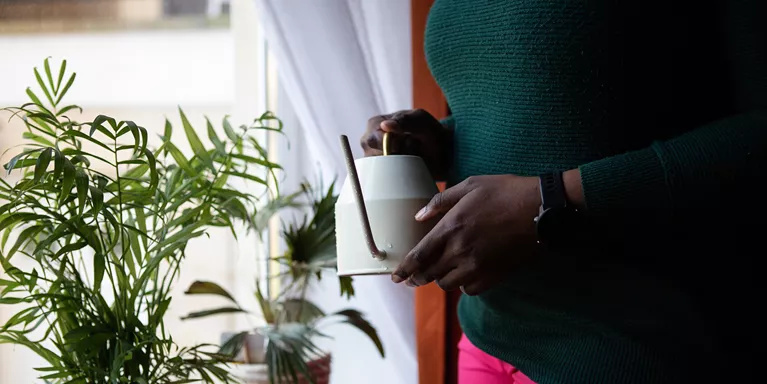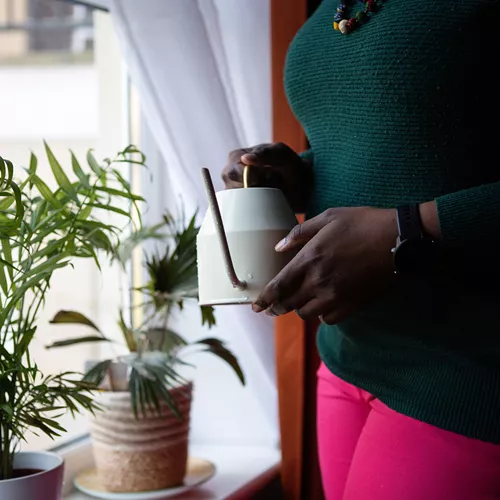Hoarding
Explains what hoarding is, possible causes and how you can access treatment and support. Includes tips for helping someone who is hoarding, as well as helping yourself.
View this information as a PDF (new window)
About hoarding
To give you an introduction to hoarding, this page covers:
What is hoarding?
Hoarding is having so many things that you cannot manage the clutter where you live, and find it difficult or impossible to throw things away.
You might hoard because you feel a strong need to keep things. But your connection to these things can cause you distress. And the impact of hoarding can affect your day-to-day life.
Hoarding disorder is a mental health problem that a doctor can diagnose. But you might also experience hoarding as part of another mental or physical health problem.
If you hoard, you might:
- Feel the need to get more things, even if you have a lot already
- Have very strong positive feelings whenever you get more things
- Feel very upset or anxious at the thought of throwing or giving things away because of your emotional attachment to them
- Find it very hard to decide what to keep or get rid of
- Find it hard to organise your things
- Have so many things that you can't use parts of the place you live in – like not sleeping on the bed or using the sink
- Have lots of disagreements with the people close to you about your things
- Find it hard to pack for trips away, like a holiday – you might pack many more things than you really need, because you can't decide what's important
I tried to throw away things that I found on the floor, but couldn't because of emotional attachment. Whether it be for practical, sentimental or aesthetic reasoning, I couldn't do it.
Why might I hoard?
Many of us have belongings we consider special and things we save. But this is different from hoarding. When you hoard, it's because you might have emotional connections or beliefs about all your things. This makes it very hard to get rid of anything.
For example, you might believe the following:
- You need to keep items 'just in case'. Even if it's been a long time since you last used the item or if you've never used it at all.
- You'll forget important information or memories if you throw things away.
- You won't cope with how you'll feel if you throw things away.
- Throwing things away will harm other people or the environment.
- If you throw anything away, you are being wasteful.
- You should arrange or dispose of things perfectly, or not at all.
- Your things make you feel happy or keep you safe.
- Your things are all unique and special, even if they're very similar.
- You simply need more storage space, or more time to sort your things out.
Lots of us share some of these beliefs about certain belongings. But we don't feel as strongly about them. And we don't experience these beliefs and feelings as part of hoarding.
Other types of hoarding
Hoarding does not only involve keeping objects in the place you live. There are other types which you might not recognise as hoarding at first. But they can make you feel the same way, for the same reasons.
Digital hoarding
Digital hoarding is when you make and keep a large number of digital files. Deleting files can cause you the same distress that other people who hoard might feel around physical objects. And you may want to keep these files for similar reasons.
It might involve buying multiple hard drives and devices, or using cloud storage or other software to keep the files. The types of files can include:
- Photos and videos
- Documents, such as Word files or spreadsheets
- Emails
- Texts or chat messages
You might experience digital hoarding on its own, or along with hoarding physical objects. You might keep a digital record of things you hoard physically. For example, by typing up an index.
Digital hoarding might start out as a way to reduce physical hoarding. For example, you might start taking pictures of objects instead of buying them. But you might end up causing similar problems as physical hoarding.
I had reasoned with myself that taking photos would not help because I would be creating five objects not just one, whether it be digital or physical, if not both.
Animal hoarding
Animal hoarding is when you keep too many animals to provide proper care for. You might have trouble noticing that this lack of care causes harm to the animals. This could include the animals not having:
- Food
- Shelter
- Enough space to exercise and stay healthy
- Vets or medical care
- Clean environments
- Safe breeding environments
To class your behaviour as animal hoarding, you don't need to have a set number of animals. It's more about how you get the animals and how you care for them.
You might experience animal hoarding on its own, or alongside other types of hoarding. Some of us might experience delusions, such as beliefs that animal rescue centres harm animals or can't look after them.
The reasons behind hoarding animals are very complicated. Those of us who hoard animals can often:
- Believe very strongly that we are saving the animals or have a duty to look after them.
- Have a very strong emotional connection to all the animals.
- Find it difficult to see that we are harming them, which can be very hurtful when people tell us we are.
Hoarding and other health problems
Hoarding can be a symptom of other physical and mental health problems. It's important to know if another health problem is behind hoarding, as this can affect the treatment.
Some health problems that might lead to hoarding include:
- Brain injuries
- Dementia
- Depression
- Obsessive-compulsive disorder (OCD)
- Schizophrenia
- Personality disorders, such as obsessive-compulsive personality disorder
- Alcohol or drug addiction
- Prader-Willi syndrome (a genetic condition)
In these cases, treating the physical or mental health problem may stop you hoarding.
Normally, you won't get a diagnosis of hoarding disorder if your hoarding is caused by another health problem. Because of this, not all of our information on hoarding might be helpful to you.
After a divorce and house move, as a single mum working full-time suffering from depression on and off for years, I didn't have the energy to face throwing things away, especially baby clothes and toys, and my small flat became increasingly full.
Effects of hoarding
Hoarding could affect you in lots of different ways. For example, you might:
- Struggle to find things you need. This can sometimes lead to money problems, for example if you can't keep on top of bills and letters.
- Avoid letting people into your space or have difficulty answering the door. This could mean you don't have visitors or get repairs done, which could lead to housing problems.
- Find it hard to keep yourself clean. For example if you can't access your bathroom or washing machine.
- Find it hard to cook and eat food. This might be because you can't access your kitchen or there's no room inside your fridge.
- Be unable to use parts of your space. For example being unable to sleep in your bed or walk along hallways because they're very cluttered.
- Be unable to quickly and safely leave in an emergency. For example, because your things are blocking doorways or escape routes.
- Distance yourself from others or have issues with people close to you. This might be because you don't want them to know about your situation, or because they say or do things that don't feel helpful to you.
- Feel ashamed or lonely. This could make you feel very isolated or affect your self-esteem.
You might also experience many of these effects if you live with someone who hoards.
I stopped asking people round as I was ashamed and it caused me a lot of guilt that I was not hosting family meals. My family wanted to 'help' by turning up with bin bags but this caused more upset.
Hoarding and stigma
Many of us have heard of hoarding, but this doesn't mean that we all understand it. The word 'hoarding' is sometimes used in the wrong way, such as:
- The media referring to panic buying as hoarding. This can happen during natural disasters or events like the coronavirus pandemic.
- People calling themselves 'hoarders' because they collect items or have more clutter than usual.
The media might also show hoarding in a very extreme way, which is different to many experiences. This can make it difficult to recognise that you're hoarding or tell other people about your experiences.
People might also make hurtful assumptions about hoarding, such as thinking it means being unclean or lazy. Hoarding doesn't mean you need help tidying up – it's unhelpful if people try to do this for you. It can feel frustrating and upsetting if people don't understand this. but it's important to remember that you are not alone.
For more information, see our pages on stigma and misconceptions.

I'm a hoarder...
It is a constant internal fight that I live with, that nobody sees.
This information was published in February 2022. We will revise it in 2025.
References and bibliography available on request.
If you want to reproduce this content, see our permissions and licensing page.













